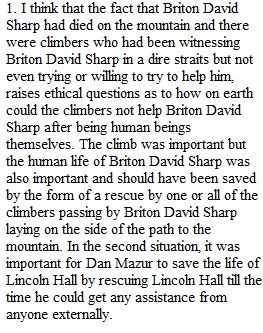


Q Submit responses to the following Cases/Readings by Sunday at 11:59 p.m. Look for the section at the end of each Reading or Case titled "Discussion Questions" and provide responses to the questions listed. Responses for each question should be well-developed and complete. While some questions may require slightly more or less for a complete answer, think in terms of a well organized paragraph for each question as a rule of thumb. My main concern is your analysis of the situations presented and the application of what you have learned from the reading to those situations, and not so much the volume of writing in response. Think through the situations and share your thoughts. Feel free to share any questions you have on the question discussion doard or email me (your instructor) directly. See the information tab or the syllabus for contact info. • Reading 1.2 • Reading 1.6 • Case 1.14 Discussion Questions 1. In 2006, the Bowen McCoy phenomenon repeated itself. Forty climbers passed by Briton David Sharp as he lay by the side of the path on an Everest trek. David Sharp died on the mountain. However, the following week, American guide Dan Mazur stayed with Australian Lincoln Hall until help could arrive. Mr. Hall survived, but Mr. Mazur had to forgo his climb and suffer the resulting financial losses from not being able to lead his group to the summit. What questions and analysis might affect the deci- sion processes in these two situations? Some grip- ping information to think about as you consider the issues: since Sir Edmund Hillary’s initial conquest of Everest in 1953, some 3,000 climbers have made it to the top, and 200 have died trying; and the cost of a climb, at that time, was $60,000. Do you have some thoughts on your credo based on Mr. McCoy’s and Mr. Mazur’s experiences and actions? 2. Why do you think no one made sure the sadhu was going to be fine? What would they have had to do to be sure that the sadhu would live? 3. Are the rules of the mountain different from the rules of our day-to-day lives? Is it survival of the fittest on the mountain? 4. Why do you think Mr. McCoy wrote about his experience? Discussion Questions 1. List any rationalizations you see in the case. 2. Describe the legal versus the ethical confrontation in these facts. Be sure to focus on Professor Yoo’s conclusion that the United States could not be prosecuted for use of the enhanced techniques. Is that the lawyer’s role, to advise on legality? What are the risks of relying on such an opinion? 3. Suppose that you were hired by the CIA and directed to conduct enhanced interrogation of enemy combatants. What would be your thoughts, reactions, emotions, and analysis of the order? Is this a question of the lesser of two evils? “Do I torture or shall I risk the loss of thousands of lives from a planned and pending terrorist plot?” Who is affected by your decision to interrogate or not interrogate? To waterboard or not to waterboard? After Osama bin Laden was found and killed by Navy Seals on May 2, 2011, it became clear that information obtained by the use of waterboarding was used to find bin Laden’s location. Does the use and result of using the information affect your decision on the decision to waterboard? 1. Explain what motivates individuals to include false information in their re?sume?s. Think about the risks, and give some examples of puffing versus falsehoods versus false impressions that you have heard of or seen in re?sume?s. 2. Does the fact that Scott Thompson landed on his feet so quickly bother you? Does his experience teach you that dishonesty pays? 3. What do you learn from the tragedy of Ms. Green? Peter Crist, a background check expert, said, “You can’t live in my world and cover stuff up. At some point in time, you will be found out if you don’t come clean. It doesn’t matter if it was 2 days ago or 20 years ago.” As you think through these examples, can you develop some important principles that could be important for your credo? 40 Was the tragedy of Ms. Green avoidable? Was Duquesne Light justi- fied in terminating her? 4. George O’Leary was hired by Notre Dame University as its head football coach in December 2001. How- ever, just five days after Notre Dame announced Mr. O’Leary’s appointment, Mr. O’Leary resigned. Mr. O’Leary’s re?sume? indicated that he had a master’s degree in education from New York University (NYU) and that he had played college football for three years. O’Leary had been a student at NYU, but he never received a degree from the institution. O’Leary went to college in New Hampshire but never played in a football game at his college and never received a letter as he claimed. When Notre Dame announced the resignation, Mr. O’Leary issued the following statement: “Due to a selfish and thoughtless act many years ago, I have person- ally embarrassed Notre Dame, its alumni and fans.” Why did the misrepresentations, which had been part of his re?sume? for many years, go undetected? Evaluate the risk associated with the passage of time and a re?sume? inaccuracy. Would it be wrong to engage in re?sume? puffing and then disclose the actual facts in an interview? Be sure to apply the models. 5. Suppose that you had earned but had never been formally awarded a college degree, due to a hold on your academic record because of unpaid debts. Would you state on your re?sume? that you had a college degree? 6. Suppose that, in an otherwise good career track, you were laid off because of an economic down- turn and remained unemployed for thirteen months. Would you attempt to conceal the thirteen-month lapse in your re?sume??
View Related Questions